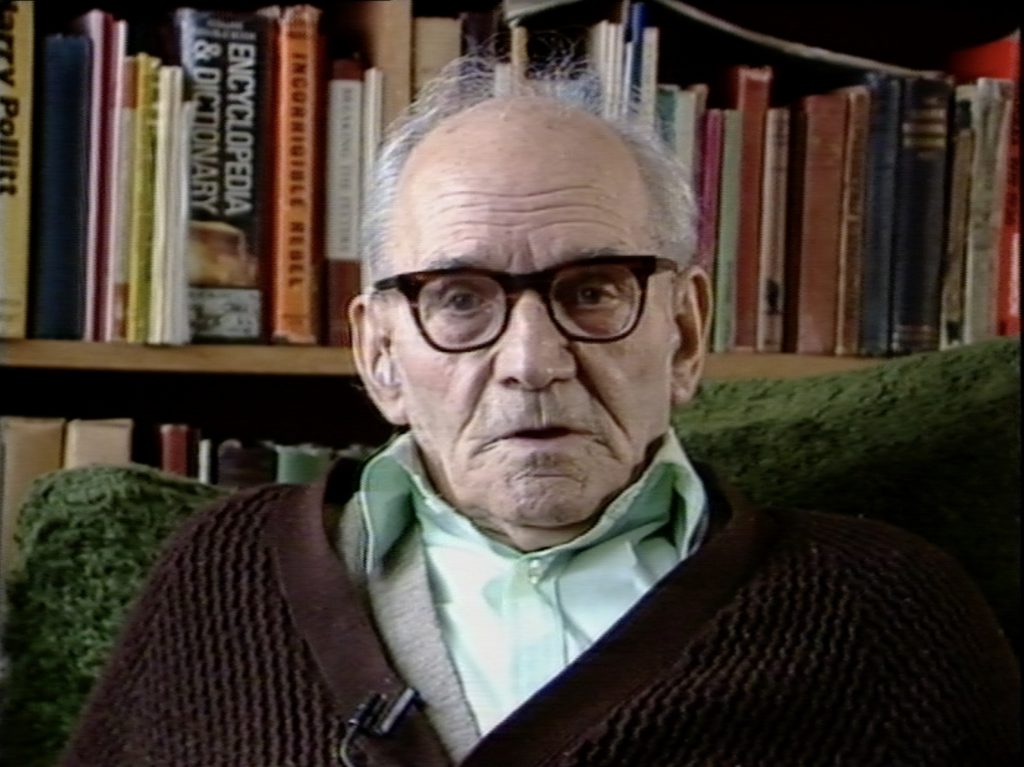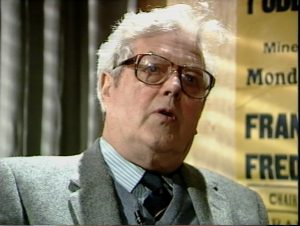No Pasaran
Collection of Interviews about the Spanish Civil War. Interview 1 is with Charlie Woods.
Two interviews filmed in 1987, one with Charlie Woods, an activist on Tyneside who had supported the volunteers who went to fight in the Spanish Civil War, the other with John Henderson and Frank Graham, who were both veterans of the Spanish Civil War. Frank Graham was later an important publisher on Tyneside, championing amongst other things the works of Jack Common. The interviews were done in connection with an exhibition at Side Gallery of photographs from the Spanish Civil War; the interviewer is Sue Todd, who was a member of the gallery team.
Charlie Woods
00:16 “ST: why the republican cause in Spain so important?
CW: Because of the general fight of the working class against facism. In terms of the link up between Italy, Spain and Germany. Any advance in Europe was to their detriment. There had been advances in Britain in the fight against Mosley, the general threat was beginning for the whole of Europe.
ST: Was there much reporting in Britain of what was happening in Spain?
CW: The Daily Worker was the main source of stories that we saw and acted upon.
I: Was the feeling strong? Did people want to go and fight?
02:40 CW: People went to fight, people were particularly conscious of what was involved in the fight against facism. There were others that were not so politically conscious who because of a variety of causes volunteered. Some were unemployed but most of the lads were fully conscious of what they were going for and what they were fighting for. It would be incorrect to the assume that they knew everything … some had no experience of warfare others did. Those that did know, and some made the ultimate sacrifice, it is to be admired.
04:16 ST: Those sentiments were reflected in a growth of a campaign in the NE in support of Republican Spain can you describe how that was started?
CW: It started in a spontaneous way as the call was for food. This call was made directly to the doors of the working class. People collected food in the streets, they worked with a loudspeaker. They went through the streets collecting tins and they were boxed up and transported to Spain.
05:59″I: What were the other activities?
CW: There were demonstrations and meetings and they were mainly in Newcastle. We usually had one or two national speakers. The people attended meetings were mainly working class. some professionals, some middle class. One meeting in particular that comes to mind was one that was addressed by Isabel Brown. There was a circus being presented the following week, and the animals were backstage. When Isabel made her appeal in support in the form of cash, there was a load roar. She took advantage of the moment and said ‘even the lions support Spain’.
08:24 ST: Were there meetings elsewhere outside Newcastle?
CW: Yes, but that became the province of the people there in the towns and villages there. But most of the places such as North Shields, South Shields, Wallsend and in mining villages that had quite large meetings. The congregation of workers, you had almost wholehearted support. There was no attempt by fascist organisation to counter the campaign.
10:09 ST: What was the role of the Labour movement?
CW: Officially the Labour movement was supporting the policy of non-intervention which in general produced a split.
The non-intervention policy meant that recruitment or the British battalion and an international brigade was more difficult. Anything that was seen to help the republican cause was refused. However the fascists in Spain were being supplied by all and sundry.
12:55 ST: Can you describe your role? You gave advice?
CW: Yes, people came to me for advice particularly members of the communist party. I remember a man and wife came together and he was a member of the communist party. “He had one time been in the fascist movement. I would advise people where to make contacts, make local arrangements for transport. We didn’t keep records for obvious reasons. There was always the threat of police action.
15:56 ST: Did you know Frank Graham?
CW: Yes, I knew him very well. I remember his work and his party in the movement very well.
I used to get word of people that had been killed and I had the job of conveying it to the nearest relatives. I could sometimes delegate it to someone else but it wasn’t a very nice job.
17:13 ST: Despite the non-intervention policy that didn’t stop activity?
CW: No, in such circumstances the objective is to overcome the obstacle. Activity went on there was public activity. The trade unionists didn’t help as trade unionists. But they did help at public meetings but that was as far as they could go.
Spike Robson was quite a character in the movement. He was a away from Britain on a long voyage we heard through the ordinary press about the mutiny on the Linaria in Port. It was loaded with materials which the crew argued could be used for the manufacture of weapons for war. They took the line that under the policy of non-intervention they weren’t supposed to carry it. They were imprisoned and came to Liverpool on a trial. But they won their case.
Tape stops at 20:44 ”
20:20 “ST: Why was the Linaria important for the NE?
CW: Most of the crew come from South Shields and Spike was the leader of the mutiny. It was industrial action in support of the republicans in Spain.
”
21:57 “ST: Who were other key people from the NE?
CW: There were people who played a part in the organisation of homes for Basque children. There was a home at Tynemouth for about 30 – 40 children. That home continued until the end of the war. Other people like the lads that were killed, who must be remembered like Cliff Lowther, Wilf Jobling and Bob Elliott from Blyth.
Tape stops at 23:46″
23:48 – 25.13 Camera rolls without sound, his wife is on camera polishing her glasses. Camera pans across to J and interviewer, sitting.
25.13 – 28:42 ”
Sound fades up mid-sentence interviewer talks to person behind camera. The sound switches off. ”
29:22 “ST: You became central to the cause in Spain, how did you become so involved?
CW: Because of the departure of George Aitken who was secretary of the communist party but he went to Spain to establish a British battalion. He left his job and I had to fill that job and that is how I came so absorbed .
Tape cuts at 30:25 due to background noise ”
“31:09 –
31:21” Low audio on tape, shot of his wife on the sofa
“31:21
–
32. 09” Shot of books on communism, Marxism and Engels etc
32:10 “ST repeats question/CW answers as above.
ST: what were you involved in before this? ”
“CW: before that I was a miner and had been unemployed for quite a while. This was following the 1926 dispute. I had been active in all the campaigns in the communist party.
People within the labour movement at grass roots level involved themselves without involving the organisation they belonged and played an active part.
Divisions in the ranks weaken the effort. ”
Tape stops 36:55 [End]
Watch Interview 1










